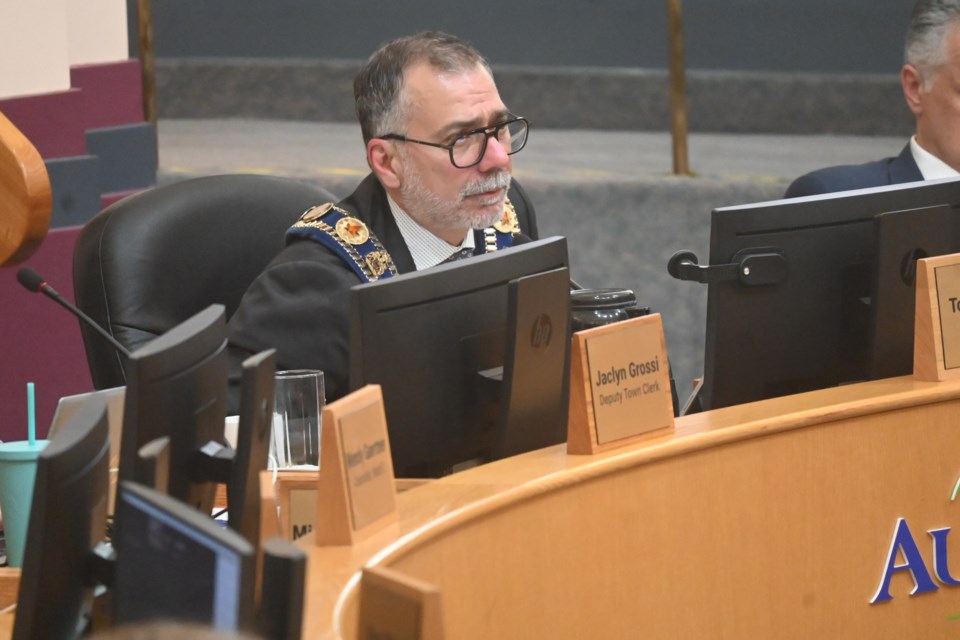Aurora could allow the construction of up to four residential units on properties zoned for single-detached, semi-detached, and townhomes, if Mayor Tom Mrakas gets his way.
Last week, Mayor Mrakas, through a motion, called on council to allow the change of up to four units, an expansion of the as-of-right permissions handed down by the province to allow up to three units per lot. Should the change be approved, it would only be applicable to lots of “sufficient size and the necessary servicing and parking requirements are met.”
The motion was approved by lawmakers at the committee level last week, but some council members questioned whether the move would lead to the goal of more affordable housing within the community.
Regardless, the mayor suggested it would move forward with or without council support given the strong mayor powers given to communities like Aurora from the Ontario government to move forward with provincially aligned housing goals.
“The Town of Aurora is forecasted to grow to a population of over 85,000 people by 2051, which represents an increase of over 30 per cent from today,” said Mayor Mrakas in his motion. “On September 26, 2023, the Council of the Town of Aurora approved a commitment to the Government of Ontario’s Housing Pledge to build 8,000 new residential units by 2031. On February 21, 2023, the Council of the Town of Aurora approved a motion to develop an Affordable Housing Action Plan aimed at promoting attainable and diverse housing options for residents as the Town grows.
“As-of-right permissions from the Province already permit three residential units per lot, with additional residential units recognized as necessary to address the ongoing housing and rental crisis. The Federal Government has made funds available through the Housing Accelerator Fund (HAF) to provide funding to local governments for the initiatives aimed at increasing affordable housing supply and supporting the development of complete, low-carbon and climate-resilient communities that are affordable, inclusive, equitable and diverse.”
First to speak to the motion at the table was Ward 2 Councillor Rachel Gilliland who said while she was in “total support of affordable housing and gentle density,” she wouldn’t consider what was on the floor as “supporting affordable housing.”
“Going up to four residential (units) as-of-right just simply means you could potentially be putting four stacked townhomes at $1.2 million,” she contended, adding that she would like to see a report with further information come back to council. “I was very surprised to see we actually want to go over and above and ask for four. OK, let’s see where that’s going to be, bring it on, but I think when we talked about this in council the last time this came forward, we were talking about stable neighbourhoods [and] that was really a big bone of contention in the sense that…the amount of land that is going there for properties would actually acquire this type of housing.
“When it comes to density, I think the type of housing is rental units and higher-density in rental units and condos, especially in that Leslie Street corridor. Already we have a lot of traffic and congestion, especially in that Town Park area… I will entertain this, but I would have to say I don’t consider this affordable housing. I would say this is more attainable and gentle density.”
A similar desire for a further report on the issue, rather than a direction from council, was voiced by Ward 1 Councillor Ron Weese, Ward 3 Councillor Wendy Gaertner, and Ward 5 Councillor John Gallo, but the mayor defended his motion, stating that three units per property have already been greenlit by the province.
“This is just moving from three to four,” said Mayor Mrakas, “so instead of a triplex that can be built anywhere in our community today, this would allow for the possibility of a fourplex. To say that a fourplex couldn’t be considered affordable housing, I find that statement ludicrous, to be quite frank. This is also a requirement by the federal government. As anyone has seen in the Housing Accelerator Fund, any municipality that is looking at getting approval of their application to help create more affordable units within their community to help push forward with streamlining processes within our community to help pay for those initiatives that you need to pass this motion. Period.
“This is going to get passed one way or another, so I will leave it at that.”
That comment, said Councillor Gallo, suggested “this is all a moot point because it sounds like he is going to use his strong mayor’s powers to move this forward anyway.”
“I don’t even know why this is in front of us up until now,” Councillor Gallo continued. “His reputation is he does things anyway. This is a planning issue. This is straight in line with the provincial mandate. I don’t even know why this is here in front of us, but regardless, you can vote it down, it will happen anyway – as he said.”
Mayor Mrakas concluded the debate by stating in his view, “it is always about creating appropriate growth in our community.”
“I believe this moves us one step forward to eliminating exclusionary zoning, which is a big priority not just for one level of government, it should be for all levels of government,” he said. “We need to move in that direction but, as I stated [in the motion] sufficient lot sizes, necessary serving, parking requirements are met. It still needs to be appropriate for our community and that is key in all things that we do when it comes to growth in the community…. We can make these necessary changes to allow for growth, but it has to be appropriate and it has to work within the confines of our vision for our community, and that is what we continue to do.”
Brock Weir is a federally funded Local Journalism Initiative reporter at The Auroran



